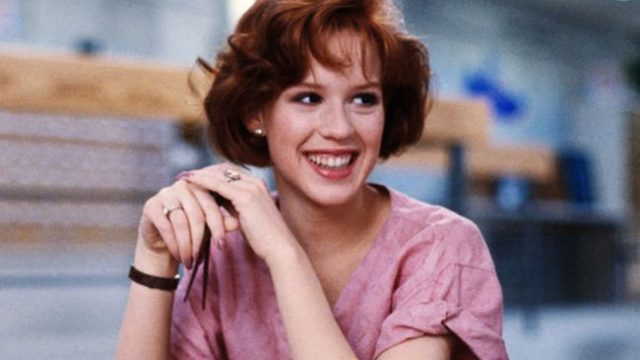I can’t help feeling sorry for anyone whose public image is as lithified as Molly Ringwald’s. She hates it, and I don’t blame her, but yes—our first thoughts of her are always going to be of what she looked like as a teenager. She’s older than I am (well, obviously; I don’t write about people younger than I am for this column), and to most people, she remains sixteen. She’s got four movies coming out in the next two years and is a recurring character on a current TV show, but she’s never going to be able to dodge her John Hughes association—and I suspect that includes to people who weren’t even born yet when she severed their professional relationship.
She’s been performing pretty much her entire life. She was the Dormouse in a stage production of Alice’s Adventures in Wonderland when she was five and recorded an album with her father and his band when she was six. (Her father is a blind jazz pianist, which I did not know.) When she was ten, she was Annie. She did some singing for Disney. She was cut from the cast of The Facts of Life. She did a couple of movies. And then, in 1984, she played Samantha in 16 Candles.
I’ve read the oral history of John Hughes films, and while her relationship with him was initially a positive one, it sounds as though he decided that she was his muse and, crucially, not a person of her own. That probably has a certain amount to do with how we remember her, because it sounds to me as though he managed to tank some of her choices and also sour her a bit on the industry, meaning she decided for herself not to take some of the choices she was offered, because she was concerned about how things might turn out. It’s unfortunate, but it’s not quite surprising.
I will probably at some point write a full piece about teenage girls as taste makers and how their preferences are disparaged even when they’re later culturally approved, and I feel as though Ringwald needs to be part of that conversation. It almost feels to me as though the roles she plays are deeper because of how she plays them than they were as written. She’s got a very pragmatic view on Andie, being confident that she and Blane didn’t stay together and that Duckie came out to Andie in college. But the discussion of Ringwald herself seems to be shaped by her status as an aspirational figure for teenage girls.
I am, as I write this, watching an interview with her on YouTube about her album of jazz standards—and also a jazz cover of “Don’t You Forget About Me” that works better than it has any right to. I’m one of the people who has positive things to say about her performance as Frannie Goldsmith in The Stand. There is, in short, more to Molly Ringwald than just Claire Standish. Heck, her voice is good enough so that I would legitimately buy a Molly Ringwald album, and not just for nostalgia reasons.
Don’t you forget about considering to support my Patreon!

